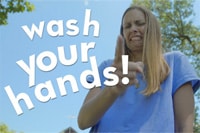- « Back to Database Search
-

-
Farms, Fairs, and Fun – Be sure to wash your hands
-

-
It’s fun to get out on a working farm to experience farm life; spend time outside and find out where your food comes from. But contact with animals is always a potential risk for getting sick. Out on the farm washing your hands is really important. Farm visitors haven’t built up an immunity to farm germs so they are more vulnerable, especially kids under 5, senior citizens, pregnant women, and anyone with an underlying medical condition. Illnesses like E. coli and Salmonella are among the illnesses you can get from being on a farm.
Handwashing with soap and water is a simple way to reduce your risk. Following six simple steps in this video will help remove germs that may have accumulated on your hands during a farm visit. Washing with soap and water is better than using hand sanitizer. Sanitizer does not work against all germs and won’t work if your hands are visibly dirty.
Even healthy animals have germs that can make you sick. Be sure to wash your hands after visiting an animal area and before doing anything else. Always wash your hands before eating.
UMASH, in partnership with the Minnesota Department of Health, has developed a variety of resources to help farmers and agritourism operators keep their visitors safe.
For more information and resources on agritourism visit: umash.umn.edu/agritourism
Watch the embedded video below, or download mp4 (right click and save file).
This video is provided for informational and educational purposes only. The video contents are solely the responsibility of the authors and do not necessarily represent the views of CDC/NIOSH or any other funders.
- « Back to Database Search
-
Farms, Fairs, and Fun – Be sure to wash your hands
-

-
It’s fun to get out on a working farm to experience farm life; spend time outside and find out where your food comes from. But contact with animals is always a potential risk for getting sick. Out on the farm washing your hands is really important. Farm visitors haven’t built up an immunity to farm germs so they are more vulnerable, especially kids under 5, senior citizens, pregnant women, and anyone with an underlying medical condition. Illnesses like E. coli and Salmonella are among the illnesses you can get from being on a farm.
Handwashing with soap and water is a simple way to reduce your risk. Following six simple steps in this video will help remove germs that may have accumulated on your hands during a farm visit. Washing with soap and water is better than using hand sanitizer. Sanitizer does not work against all germs and won’t work if your hands are visibly dirty.
Even healthy animals have germs that can make you sick. Be sure to wash your hands after visiting an animal area and before doing anything else. Always wash your hands before eating.
UMASH, in partnership with the Minnesota Department of Health, has developed a variety of resources to help farmers and agritourism operators keep their visitors safe.
For more information and resources on agritourism visit: umash.umn.edu/agritourism
Watch the embedded video below, or download mp4 (right click and save file).
This video is provided for informational and educational purposes only. The video contents are solely the responsibility of the authors and do not necessarily represent the views of CDC/NIOSH or any other funders.
